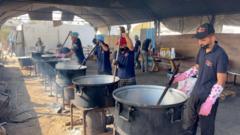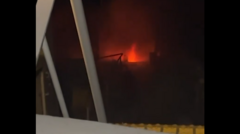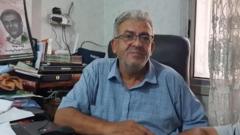In a shift from earlier consensus, a rising number of Israeli reservists are challenging the government's strategy in Gaza, pressuring Prime Minister Netanyahu to focus on the release of hostages held by Hamas rather than ongoing military operations.**
Israeli Reservists Demand Shift in Gaza Policy Amid Growing Discontent**

Israeli Reservists Demand Shift in Gaza Policy Amid Growing Discontent**
Thousands of Israeli reservists are calling for an end to the Gaza conflict, urging the government to prioritize hostage negotiations over military action.**
Israel's war in Gaza continues to face mounting criticism as a significant number of reservists speak out against the ongoing conflict. In recent weeks, thousands of Israeli reservists from various military branches have signed letters urging Prime Minister Benjamin Netanyahu's government to cease military actions and prioritize diplomatic efforts to negotiate the release of the remaining 59 hostages currently held by Hamas.
Eighteen months ago, many Israelis stood united behind the objective of defeating Hamas and securing the hostages’ freedom. A ceasefire earlier this year offered a glimmer of hope, as over 30 hostages were freed. However, that optimism faded when Israel resumed hostilities in mid-March, following the breakdown of that ceasefire.
Danny Yatom, a former head of Israel's Mossad, voiced his concerns about the government's priorities, suggesting that Netanyahu is more focused on maintaining power than on saving lives. “We came to the conclusion that Israel is going to a very bad place,” Yatom stated, emphasizing a national rather than political motive for his dissent.
The first public letter calling for an end to the Gaza war was released in early April, signed by around 1,000 air force reservists who expressed that continuing military action does not serve the proclaimed objectives and endangers hostages. In the following weeks, nearly every military unit, including elite and intelligence divisions, added their signatures, bringing the total to over 12,000.
While a surge of reservists quickly rallied to serve post-October 7, attendance has reportedly dipped to between 50-60%, indicating a deepening crisis within Israel's reliance on its reserves for military engagement. One officer, identified only as "Yoav," has publicly voiced his reluctance to reengage in Gaza, reflecting a broader sentiment among reservists who feel disillusioned by the war's lasting consequences.
Yoav expressed that although he once believed he was contributing positively by fighting Hamas, he now fears for the moral integrity of Israel itself. "It’s not about beating Hamas anymore," he contended, "it's about losing our country."
Recent polls suggest a notable shift in public support is developing towards the need for a ceasefire and a focus on negotiations for hostage releases, echoing the sentiments expressed by reservists.
In Tel Aviv, ongoing anti-war protests showcased poignant displays, with images of both hostages and Palestinian children lost during the conflict, reflecting a shared grief and a demand for government accountability. The police had momentarily attempted to restrict such displays but swiftly retreated in the face of public outrage.
Despite the protest activities and rising dissent, Netanyahu maintains his stance that military pressure is indispensable for securing the hostages' release, arguing that negotiations must be backed by the ongoing fight against Hamas.


















